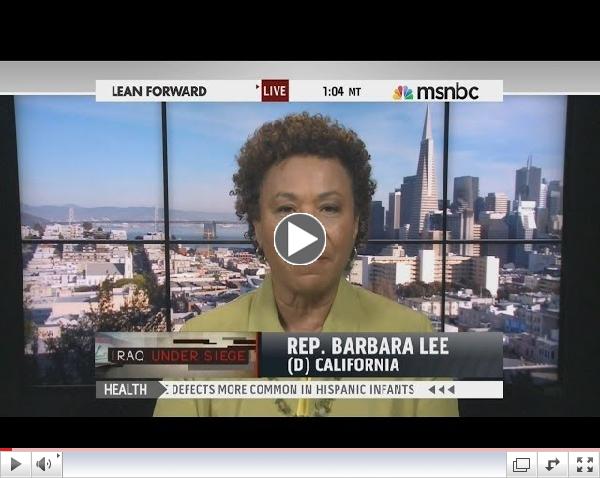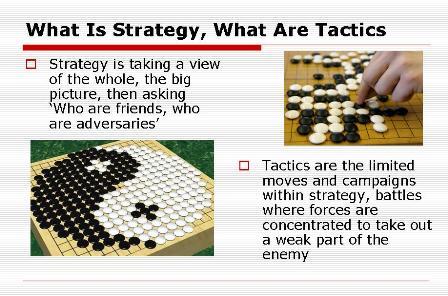 | Barbara Lee Takes on Cheney, Opposes Funding
for New War on Iraq
|
|
Blog of the Week... 
|
 The new annual edition of our journal of discussion and analysis is now out. More than 170 pages, it includes 14 articles on strategy austerity, organizing, and the right. Cost is $10 plus shipping. Or get one by becoming a sustainer. Click the title to buy it directly. The new annual edition of our journal of discussion and analysis is now out. More than 170 pages, it includes 14 articles on strategy austerity, organizing, and the right. Cost is $10 plus shipping. Or get one by becoming a sustainer. Click the title to buy it directly.
|
 | |
Journal of the Black Left Unity Network
|
|

New CCDS Book Reporting on Vietnam
|
|
Radical Jesus:
A Graphic History of Faith  By Paul BuhleHerald Press By Paul BuhleHerald Press
|

Want to Know what CCDS has
been doing...Check it Out!
|
 Keep On Keepin' On Keep On Keepin' OnHating the 'Middle Class,' Why Socialists Run in Elections, Strategy and Tactics Slide Slow, Class and Privilege, the Green New Deal ...and other Short Posts on Tumblr by Carl Davidson
|

Edited by Carl Davidson Revolutionary Youth the the New Working Class: The Praxis Papers, the Port Authority Statement, the RYM Documents and other Lost Writings of SDS
Changemaker, 273pp, $22.50
For the full contents, click the link and view 'Preview' under the cover graphic.
|
|
By Randy Shannon, CCDS

"Everyone has the right to work, to free of employment, to just and favorable conditions of work and to protection against unemployment."
- United Nations Universal Declaration of Human Rights, December 10, 1948
I. Introduction
The "Great Recession" that began in 2007 has caused the greatest percent of job losses since the Great Depression of 1929. This crisis is the end of an era of unrestrained 'neo-liberal' capitalism that became public policy during the Reagan administration. The crisis marks a new level of instability with the growth of a global financial elite that targeted US workers and our trade unions after World War II.
|
|
Order Our
Full Employment Booklets
 |
...In a new and updated 2nd Edition
Capitalism may well collapse under its own excesses, but what would one propose to replace it? Margaret Thatcher's mantra was TINA...There Is No Alternative. David Schweickart's vision of "Economic Democracy" proposes a serious alternative. Even more fundamentally, it opens the door to thinking about alternatives. His may or may not turn out to be the definitive "successor system," but he is a leader in breaking out of the box. |
 by Paul KrehbielAutumn Leaf Press, $25.64
by Paul KrehbielAutumn Leaf Press, $25.64 | | Shades of Justice Video: Bringing Down a President, Ending a War |
|
 By Giuseppe Fiori
Verso, 30 pages
|

Essays on Mondragon, Marx, Gramsci
and the Green and Solidarity Economies |
Solidarity Economy:What It's All About

Edited by Jenna Allard, Carl Davidson and Julie Matthaei
Buy it here...
|

- Foreword by Susan Brownmiller
- Preface by Ken Wachsberger
$37.50 + $6 shipping
|
|
Discussion Documents for a Militant Movement

By Don Hamerquist
|
|
|
|
An Invitation to CCDSers and Friends...
 Can We Get Can We Get
Enough Clout
Before a Climate
Doomsday?
We're the Committees of Correspondence for Democracy and Socialism...Do you have friends who should see this? Pass it on...Do you have a blog of your own? Others you love to read every day? Well, this is a place where you can share access to them with the rest of your comrades. Just pick your greatest hits for the week and send them to us at carld717@gmail.com! Most of all, it's urgent that you oppose war on Iran, defend voter rights, plan for 2014 races now, oppose austerity, support the 'Moral Mondays' in North Carolina, the Congressional Progressive Caucus' 'Back to Work Budget'! We're doing more than ever, and have big plans. So pay your dues, make a donation and become a sustainer. Do it Now! Check the link at the bottom... |
Twenty-First-Century Energy Wars

Global Conflicts Are Increasingly Fueled by the Desire for Oil and Natural Gas -- and the Funds They Generate
By Michael T. Klare
Tomdispatch.com
Iraq, Syria, Nigeria, South Sudan, Ukraine, the East and South China Seas: wherever you look, the world is aflame with new or intensifying conflicts.
At first glance, these upheavals appear to be independent events, driven by their own unique and idiosyncratic circumstances.
But look more closely and they share several key characteristics -- notably, a witch's brew of ethnic, religious, and national antagonisms that have been stirred to the boiling point by a fixation on energy.
In each of these conflicts, the fighting is driven in large part by the eruption of long-standing historic antagonisms among neighboring (often intermingled) tribes, sects, and peoples. In Iraq and Syria, it is a clash among Sunnis, Shiites, Kurds, Turkmen, and others; in Nigeria, among Muslims, Christians, and assorted tribal groupings; in South Sudan, between the Dinka and Nuer; in Ukraine, between Ukrainian loyalists and Russian-speakers aligned with Moscow; in the East and South China Sea, among the Chinese, Japanese, Vietnamese, Filipinos, and others. It would be easy to attribute all this to age-old hatreds, as suggested by many analysts; but while such hostilities do help drive these conflicts, they are fueled by a most modern impulse as well: the desire to control valuable oil and natural gas assets. Make no mistake about it, these are twenty-first-century energy wars.
It should surprise no one that energy plays such a significant role in these conflicts. Oil and gas are, after all, the world's most important and valuable commodities and constitute a major source of income for the governments and corporations that control their production and distribution.
Indeed, the governments of Iraq, Nigeria, Russia, South Sudan, and Syria derive the great bulk of their revenues from oil sales, while the major energy firms (many state-owned) exercise immense power in these and the other countries involved. Whoever controls these states, or the oil- and gas-producing areas within them, also controls the collection and allocation of crucial revenues. Despite the patina of historical enmities, many of these conflicts, then, are really struggles for control over the principal source of national income....(Click title for more)
|
|

By Tom Hartman
Alternet
July 4, 2014 - There's something lurking deep under the frozen Arctic Ocean, and if it gets released, it could spell disaster for our planet.
That something is methane.
Methane is one of the strongest of the natural greenhouse gases, about 80 times more potent than CO2, and while it may not get as much attention as its cousin CO2, it certainly can do as much, if not more, damage to our planet.
That's because methane is a far more potent greenhouse gas than carbon dioxide, and there are trillions of tons of it embedded in a kind of ice slurry called methane hydrate or methane clathrate crystals in the Arctic and in the seas around the continental shelves all around the world.
If enough of this methane is released quickly enough, it won't just produce the same old global warming.
It could produce an extinction of species on a wide scale, an extinction that could even include the human race.
If there is a "ticking time bomb" on our planet that could lead to a global warming so rapid and sudden that we would have no way of dealing with it, it's methane.
Right now, estimates suggest that there's over 1,000 gigatons - that's a thousand billion tons - of carbon in methane form trapped just under the Arctic ice. And if stays trapped under the ice, we might have a chance.
But, thanks to the global warming that's already occurring, Arctic sea ice is melting at unprecedented rates.
In fact, as Gaius Publius points out over at America Blog [3], just about every reputable projection on the loss of Arctic sea ice has been wrong in a very, very bad way.
The lack of sea ice cover in the Arctic that we're seeing today wasn't supposed to happen for 20+ more years according to 13 of the most accurate models.
As all that sea ice melts, the Arctic ice which once reflected sunlight and prevented global warming, becomes a very blue ocean that absorbs heat and causes even more melting.
And this all means that more and more methane is being released into the atmosphere much faster than expected, speeding up the process of global warming and climate change....(Click title for more)
|

By The Daily Take Team
The Thom Hartmann Program via Truthout
July 10, 2014 - The world is going solar.
According to new data released by the Fraunhofer Institute, in the first half of 2014, renewable energy, like solar power, accounted for nearly 31 percent of all electricity produced in Germany.
In fact, solar power generation was up 28 percent during the first half of 2014, compared to the same time last year.
For the first time ever in Germany - the cloudiest country in western Europe - solar power and other forms of renewable energy created more energy and electricity production than dirty coal.
And, in June, Germany set a solar power record, using solar power to generate 50 percent of overall electricity demand for part of a day.
While Germany is relying heavily on renewable energy today to help fight global warming and climate change, it has had a pretty standard energy evolution.
In the 18th century, Germany was burning wood. In the 19th century, it was burning coal. In the 20th century, it was burning oil. Today it's getting electricity from solar and renewables.
That's a typical evolution for a developed country (that's not controlled by the financial interests of Big Oil).
But what if the dozens of developing countries across the globe, that are still stuck in the 18th century and that still rely on burning wood for energy, jumped directly to renewable energy, and leapfrogged the whole carbon cycle?
Can you imagine how that would transform the fight against global warming and climate change?
Well, that's exactly what's going on right now in rural India....(Click title for more)
|
By Tom Hayden
Progressive America Rising via San Francisco Chronicle
July 4, 2014 - Most environmentalists see themselves on the left of the political spectrum, so what's the Left to do when leaders of finance capital take leading roles in confronting climate change?
That development blossomed into public view last month with a coordinated offensive led by Hank Paulson, the Republican architect of the 2008 Wall Street bailout, and two billionaires, former New York Mayor Michael Bloomberg, who was a leading opponent of Occupy Wall Street, and Bay Area liberal Democrat Tom Steyer, to try to influence the national dialogue. Paulson initiated the effort with a June 21 manifesto in the New York Times urging a tax on carbon.
At the same time, Bloomberg released an economic report declaring that zero-emission energy sources, led by solar, will make up more than half the world's power mix by 2030. Bloomberg already has given the Sierra Club $50 million for its campaign to shut down Big Coal. The independent Steyer is one of the biggest funders of environmentalist political campaigns, and may one day be a candidate himself.
California's groundbreaking climate-change policies, including its cap-and-trade program, are based on the assumption that "when faced with the certainty of reasonable policy, businesses innovate and successfully cut pollution with consumer-oriented solutions that drive their markets forward and continue economic growth." California's tailpipe emissions standards, for example, overcame Detroit's resistance and led to a doubling of automobile efficiency measures in recent decades.
As more finance capitalists go green, the trend will be problematic for those with an anticapitalist or socialist agenda. They blame capitalism for the unfettered exploitation of the Earth's resources and life-supporting ecosystem. History shows that fundamental critique to be on the mark, though it can be dogmatic in its assumptions.
To demand that the environmental movement turn socialist - or anarchist - as a precondition of progress, however, is a hopeless venture. Socialists and progressives of all stripes need to recall the lessons from history where capitalists surprised their detractors by incorporating substantial reforms, partly in order to save capitalism itself. The New Deal was such a model.
We are entering another historic moment of potential market adjustment born out of necessity. Progressives can play a vital role in the unpredictable transition ahead. They can help broker a Green New Deal....(Click title for more)
|
From the Arab Springs to the Moral Mondays: Fusion Politics Meets 21st Century Imperialism

By Harry Targ Online University of the Left / CCDS
For presentation at the upcoming "Moving Beyond Capitalism" Conference, Center for Global Justice, San Miguel de Allende, Mexico July 29-August 5, 2014
Introduction
The deepening 21st century crises of capitalism-from growing economic impoverishment to neo-fascism to literal destruction of planet earth-demand movements and visions of change unparalleled in quantities and qualities of response. Anti-capitalist responses to these crises range from helplessness to spontaneous activism. Often political reactions ignore the history and context of the crises and the movements that have come before that have planted the seeds of fundamental social change. This paper will survey movements of social change in the era of neoliberal globalization suggesting both the breadth of such movements and the historical context from which they came. The tasks for today still require an analysis of the nature of existing systems and responses, visions of desirable alternatives, and contextualized discussions of moving from here to there. "Moving Beyond Capitalism" requires such a grounding of the future in the past and the present.
21st Century Imperialism: Post-Cold War Perspectives on Global Political Economy
The collapse of the Soviet Union transformed world affairs, scholarly analyses of international relations, punditry, and rationales for imperial foreign policies. A new buzzword became part of political discourse to describe the international system: "globalization." Almost immediately a large literature was generated suggesting that the world had changed. Globalization was replacing the system of often hostile nation-states that had characterized the world since the sixteenth century.[1]
While interpretations of globalization varied, the common conception of the term suggested that a process of relations was occurring in which interactions between nations, business and financial organizations, groups, and peoples had become so frequent and intense that they were creating one global society.[2] Major globalizing institutions included multinational corporations, especially the 200 largest global corporations with production, distribution, and decision-making facilities in many countries, and international financial institutions engaged in speculative activities all across the globe. At the cultural level a handful of media conglomerates produced a large percentage of the cultural products, images, artistic endeavors, and print and electronic information that the world consumed. Finally, international institutions such as the World Bank, the International Monetary Fund, and the newly created World Trade Organization brought international influence to bear on states that resisted the globalization process.
In conjunction with the collapse of socialism on the world stage, apologists for globalization celebrated it as transformative, leading to a new world order.[3] With increasing interaction, it was claimed, old inter-state conflicts would be reduced in part because the salience of states was declining. Also, globalization was bringing people together with shared economic endeavors, social values, and culture. The process of global integration would over time lead to the creation of truly global institutions and society. And, some commentators suggested that globalization was an inevitable byproduct of a technological revolution.
Another set of theorists, global dialecticians,[4] responded to the new theorizing by reminding people that globalization was not new. In fact, they argued, globalization was a characteristic feature of capitalism as a mode of production. Marx, in The Communist Manifesto, recognized that capitalists sought markets, cheap labor and natural resources all across the globe. Having reminded readers of the historic nature of the globalization process, the global dialecticians suggested that particular features of contemporary history made the globalization process more likely; the United States as the last remaining superpower and the transformation of communications via the internet for example. For the dialecticians, the process of globalization was new and old at the same time. It had its roots in the rise of capitalism out of feudalism and it was transformed by economic, political, military, and technological changes that had occurred over the last fifty years....(Click title for more)
|

By Dani McClain
The Nation
July 1, 2014 - Housed in a brick church on a residential corner in Greensboro, North Carolina, the Beloved Community Center is a living monument to the city's role in civil and human rights struggles, from the early 1960s to the present.
Pay it a visit and the people who run the place will point out their younger selves in the decades-old photos of rallies and voter-registration drives that cover the walls. They'll recount a standoff between local black students and the police in 1969 that left a 20-year-old dead. They'll tell you how they organized a citywide truth and reconciliation commission after members of the Klan gunned down five people in the Greensboro massacre of 1979.
They'll talk about why, nearly a decade ago, they supported black and Latino workers in the state who tried to unionize a pork-processing plant despite management's effort to intimidate them with immigration raids. And they'll look at you quizzically if you ask, as I did when I visited in May, why they joined the Moral Monday movement, which has upended North Carolina's politics and dominated headlines for the past year.
"There wasn't a joining," says Joyce Johnson, a co-founder of the center. "There was a flow."
Given the news coverage, it's easy to think that the Moral Monday protests and Forward Together-the movement behind the Monday mobilizations-came out of nowhere. It's easy to believe that more than 900 people were arrested while engaging in civil disobedience last spring and summer because the laws passed by North Carolina's conservative legislature and signed by Republican Governor Pat McCrory were just too draconian for a state accustomed to a more moderate leadership. It's easy to read the accounts of teachers outraged by attacks on tenure, or swing voters upset by McCrory's refusal to expand Medicaid under the Affordable Care Act, and think that the mobilization is under way because politics-aided by model legislation crafted by ALEC and funding from the Koch brothers-just got too ugly in the Tar Heel State.
Yet such assessments have it only half-right. Yes, in the last midterm election, Republicans won control of the State Legislature for the first time since the late nineteenth century. And yes, they proceeded to redraw district lines in a cynical effort to maintain the GOP's lock on the Statehouse. Emboldened by their win, they've passed a voter-suppression law that threatens to disenfranchise hundreds of thousands of people. They've passed what the spokesperson for a state Planned Parenthood affiliate describes as "an anti-abortion wish list" that restricts coverage for city and county employees and requires that clinics meet the standards of outpatient surgical centers-a change expected to force most clinics to close. The Legislature also gutted the state's education budget and ended the earned-income tax credit. Those moves infuriated North Carolinians, and the protests have continued into the current summer legislative session, with sixty people arrested as of late June. But it's also true that years of steady effort among the state's organizers and advocates made it possible for this particular moment to become a movement.
Johnson's husband, the Rev. Nelson Johnson, was a member of that first group of seventeen people arrested on April 29 of last year, on the very first Moral Monday. "People see the great crowds on Mondays," he says. "What they don't see is all the work that came before that."
* * *
The Johnsons are part of a curiously named coalition called HKonJ, which stands for Historic Thousands on Jones Street (where the state capital's legislative buildings are located), and which laid the groundwork for Moral Mondays and the Forward Together movement.
In December 2006, sixteen organizations-representing clergy, labor, women's rights, LGBTQ rights and racial justice-came together to form what the Rev. William Barber II, the head of the state NAACP and the movement's most visible leader, called a "transformative fusion coalition."
Transformative fusion means that each organization came to the coalition with a deep commitment not just to advance their own political priorities, Barber explains, but to advance the various causes of the other coalition members as well. Together, the coalition members would review state policy from an anti-racist and anti-poverty perspective and come up with a fourteen-point agenda, as well as an action plan for achieving those goals. Asked how the organizations make decisions and set priorities collaboratively, Barber replies that the key is sharing a broader vision for the state's future.
"It's about fundamental change, not incremental change," he tells me. "Victory on one issue does not mean you leave the coalition."...(Click title for more)
|
 Out of the Mountains: Out of the Mountains:
The Coming Age of the Urban Guerrilla
by David Kilcullen
October 2013: Oxford University Press
David Kilcullen leaves Iraq and Afghanistan behind to concentrate on how to keep malignant masses of desperate people at bay in a coming urban apocalypse
By Tom Hayden
The Rag Blog
July 8, 2014 - 'Out of the Mountains: The Coming Age of the Urban Guerrilla' by David Kilcullen (October 2013: Oxford University Press); Hardcover; 352 pp; $27.95.]
David Kilcullen is the brilliant but largely invisible architect of America's failed counterinsurgency policies in Iraq. According to Bob Woodward, Kilcullen was the top counterinsurgency adviser to Gen. David Petraeus during the "surge" of targeted killings of Sunni insurgents, which was coupled with the U.S.-funded alliance with competing Sunni tribes known as "The Awakening," in 2007-'8.
The Pentagon declared the victory over those insurgents was based on a two-pronged approach of killing the "irreconcilables" while arming and funding the "reconcilables." The terminology was Petraeus' but the doctrine was Kilcullen's.
"While many boast of victory, defeat is always an orphan," President John Kennedy said after his Bay of Pigs debacle. Now that those insurgents the U.S. surge "defeated" are rising again in the Sunni regions of northwest Iraq and pockets below Baghdad, a review of Kilcullen's (and Petraeus') strategic thinking should be in order. But the public debate is politicized narrowly into whether to blame George Bush, Barack Obama, or both, not the underlying national security debates about counterterrorism or counterinsurgency.
Some will assert there was nothing wrong with the U.S. military doctrines, but that the "surge" - and the war itself - should have continued indefinitely, regardless of casualties, cost and public opinion. Others might blame the stubborn al-Maliki for failing to share power and resources with the Sunnis. Whether or not that was a foolish liberal hope, the U.S. never used its might to block al-Maliki's Shiite regime from imposing sectarian exclusion on the disempowered Sunni minority. Now it seems far too late.
He was an original proponent of the Long War doctrine that underlies our military policy.
Kilcullen apparently has moved on too. He was an original proponent of the Long War doctrine that underlies our military policy, a war against Muslim insurgents projected to last 50 to 80 years, approximately the length of the Cold War with the Soviet Union. In the Long War perspective, Iraq is only a phase, a "small war within a long one," as he has dubbed it in a subtitle. Kilcullen also is a critic of Obama's drone war strategy too, on the hawkish grounds that thousands of advisers and ground forces are necessary to winning.
But Kilcullen's recent writings leave Iraq and Afghanistan behind to concentrate on the greatest current threat he sees: how to keep malignant, violent, and irrational masses of desperate people at bay in a coming urban apocalypse. Kilcullen's Out of the Mountains, the Coming Age of the Urban Guerrilla (Oxford, 2013) is an important read for anyone seeking to avoid the wars he is preparing for....(Click title for more)
|
|
 | | Sima Cunningham Live - Creature of Habit |
By the Speckled Record
The other day I was in Yerevan, Armenia and met some friends at the city's bohemian bar, Calumet ("It's cal-oo-may!" I was told. Excuse me). The floor near the stage was covered in foot high wooden tables and multi-colored bean bag chairs flat and dusty from heavy butt traffic. I found my way onto half a bean bag, pulled my legs up to my chest to keep them out of a stranger's lap, and listened to Sima Cunningham blast.
She fits the big-voice-in-a-little-body cliché, but that big voice is so much full of soul I almost cried while she was singing about an alien coming to earth and falling in love. I have no idea what she actually said in that song; I just felt lucky to be seeing someone commit to sound like that while I was sitting right there. Perhaps it was the wall created by people standing behind our bean bag collective that made me feel like it was just a few of us and that voice. When she wasn't belting herself, she was backing up her multi-instrumental compadre who's most impressive work was certainly a harmonica solo which wailed over his own electric guitar work. He made me want to study harmonica. Really.
Her voice is somewhere around Brandi Carlile and Shara Worden of My Brightest Diamond and a lot of Asthmatic Kitty projects, but her 21-year-old voice made me feel younger. Ok, I'm 25, but I'll restate: I felt at taken back a few years, like things were more sunrise and new leaves and gentle. Whether she was wailing on her cover of "Jolene" or poppin' around on her own "Them Apples", I could have listened to her all night.
Unfortunately some drunk guy with a euro-fro got hold of the electric guitar, and despite efforts to interrupt his chordless noise-strumming and uncomfortable mic-wailing, he kept going and going. I got going myself, walking out onto cold, late-night Yerevan singing "Hey Jude" and remembering how just a little while ago a whole room full of us sang the song together, led by a sweet, sweet voice.
Good news for you/me/us all: she's giving her second album, Time Is Never Your Friend, for FREE on her website. FREE. So her tender "Last Christmas", a folksy trip through the last holiday in her childhood home, will get me good an teared-up while I mourn the loss of my youth/pine for holiday tradition back home, etc. The album itself in no way measures up to the sheer pleasure of listening to the young soul set a room on fire, but seeing as how she left Armenia the morning after her show, she's not likely to be playing around here again any time soon....(Click title for more)
|
Keep up with the Moral Mondays with a Red Resolution...
Become a CCDS member today!
 The time is long past for 'Lone Rangers'. Being a socialist by your self is no fun and doesn't help much. Join CCDS today--$36 regular, $48 household and $18 youth. The time is long past for 'Lone Rangers'. Being a socialist by your self is no fun and doesn't help much. Join CCDS today--$36 regular, $48 household and $18 youth.
Better yet, beome a sustainer at $20 per month, and we'll send you a copy of Jack O'Dell's new book, 'Climbing Jacobs Ladder,' drawing on the lessons of the movement in the South in the 1950s and 1960s.
Solidarity, Carl Davidson, CCDS
|
|
|